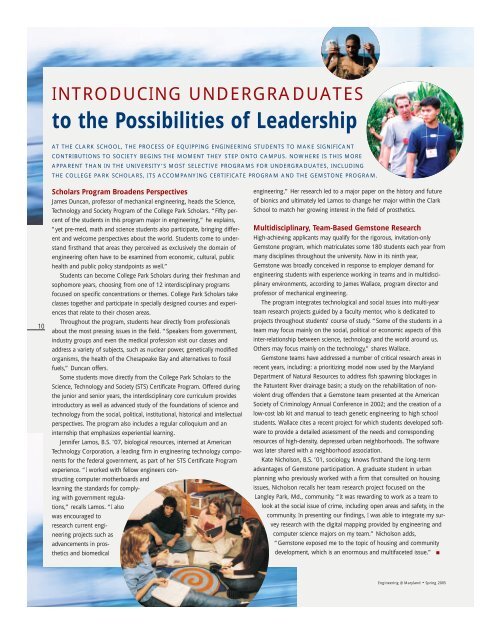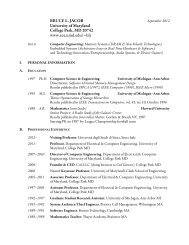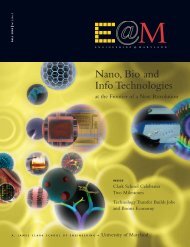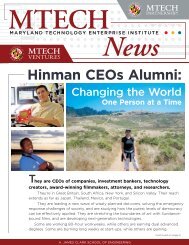Spring 2005 - A. James Clark School of Engineering - University of ...
Spring 2005 - A. James Clark School of Engineering - University of ...
Spring 2005 - A. James Clark School of Engineering - University of ...
Create successful ePaper yourself
Turn your PDF publications into a flip-book with our unique Google optimized e-Paper software.
10<br />
INTRODUCING UNDERGRADUATES<br />
to the Possibilities <strong>of</strong> Leadership<br />
AT THE CLARK SCHOOL, THE PROCESS OF EQUIPPING ENGINEERING STUDENTS TO MAKE SIGNIFICANT<br />
CONTRIBUTIONS TO SOCIETY BEGINS THE MOMENT THEY STEP ONTO CAMPUS. NOWHERE IS THIS MORE<br />
APPARENT THAN IN THE UNIVERSITY’S MOST SELECTIVE PROGRAMS FOR UNDERGRADUATES, INCLUDING<br />
THE COLLEGE PARK SCHOLARS, ITS ACCOMPANYING CERTIFICATE PROGRAM AND THE GEMSTONE PROGRAM.<br />
Scholars Program Broadens Perspectives<br />
<strong>James</strong> Duncan, pr<strong>of</strong>essor <strong>of</strong> mechanical engineering, heads the Science,<br />
Technology and Society Program <strong>of</strong> the College Park Scholars. “Fifty percent<br />
<strong>of</strong> the students in this program major in engineering,” he explains,<br />
“yet pre-med, math and science students also participate, bringing different<br />
and welcome perspectives about the world. Students come to understand<br />
firsthand that areas they perceived as exclusively the domain <strong>of</strong><br />
engineering <strong>of</strong>ten have to be examined from economic, cultural, public<br />
health and public policy standpoints as well.”<br />
Students can become College Park Scholars during their freshman and<br />
sophomore years, choosing from one <strong>of</strong> 12 interdisciplinary programs<br />
focused on specific concentrations or themes. College Park Scholars take<br />
classes together and participate in specially designed courses and experiences<br />
that relate to their chosen areas.<br />
Throughout the program, students hear directly from pr<strong>of</strong>essionals<br />
about the most pressing issues in the field. “Speakers from government,<br />
industry groups and even the medical pr<strong>of</strong>ession visit our classes and<br />
address a variety <strong>of</strong> subjects, such as nuclear power, genetically modified<br />
organisms, the health <strong>of</strong> the Chesapeake Bay and alternatives to fossil<br />
fuels,” Duncan <strong>of</strong>fers.<br />
Some students move directly from the College Park Scholars to the<br />
Science, Technology and Society (STS) Certificate Program. Offered during<br />
the junior and senior years, the interdisciplinary core curriculum provides<br />
introductory as well as advanced study <strong>of</strong> the foundations <strong>of</strong> science and<br />
technology from the social, political, institutional, historical and intellectual<br />
perspectives. The program also includes a regular colloquium and an<br />
internship that emphasizes experiential learning.<br />
Jennifer Lamos, B.S. ’07, biological resources, interned at American<br />
Technology Corporation, a leading firm in engineering technology components<br />
for the federal government, as part <strong>of</strong> her STS Certificate Program<br />
experience. “I worked with fellow engineers constructing<br />
computer motherboards and<br />
learning the standards for complying<br />
with government regulations,”<br />
recalls Lamos. “I also<br />
was encouraged to<br />
research current engineering<br />
projects such as<br />
advancements in prosthetics<br />
and biomedical<br />
engineering.” Her research led to a major paper on the history and future<br />
<strong>of</strong> bionics and ultimately led Lamos to change her major within the <strong>Clark</strong><br />
<strong>School</strong> to match her growing interest in the field <strong>of</strong> prosthetics.<br />
Multidisciplinary, Team-Based Gemstone Research<br />
High-achieving applicants may qualify for the rigorous, invitation-only<br />
Gemstone program, which matriculates some 180 students each year from<br />
many disciplines throughout the university. Now in its ninth year,<br />
Gemstone was broadly conceived in response to employer demand for<br />
engineering students with experience working in teams and in multidisciplinary<br />
environments, according to <strong>James</strong> Wallace, program director and<br />
pr<strong>of</strong>essor <strong>of</strong> mechanical engineering.<br />
The program integrates technological and social issues into multi-year<br />
team research projects guided by a faculty mentor, who is dedicated to<br />
projects throughout students’ course <strong>of</strong> study. “Some <strong>of</strong> the students in a<br />
team may focus mainly on the social, political or economic aspects <strong>of</strong> this<br />
inter-relationship between science, technology and the world around us.<br />
Others may focus mainly on the technology,” shares Wallace.<br />
Gemstone teams have addressed a number <strong>of</strong> critical research areas in<br />
recent years, including: a prioritizing model now used by the Maryland<br />
Department <strong>of</strong> Natural Resources to address fish spawning blockages in<br />
the Patuxtent River drainage basin; a study on the rehabilitation <strong>of</strong> nonviolent<br />
drug <strong>of</strong>fenders that a Gemstone team presented at the American<br />
Society <strong>of</strong> Criminology Annual Conference in 2002; and the creation <strong>of</strong> a<br />
low-cost lab kit and manual to teach genetic engineering to high school<br />
students. Wallace cites a recent project for which students developed s<strong>of</strong>tware<br />
to provide a detailed assessment <strong>of</strong> the needs and corresponding<br />
resources <strong>of</strong> high-density, depressed urban neighborhoods. The s<strong>of</strong>tware<br />
was later shared with a neighborhood association.<br />
Kate Nicholson, B.S. ’01, sociology, knows firsthand the long-term<br />
advantages <strong>of</strong> Gemstone participation. A graduate student in urban<br />
planning who previously worked with a firm that consulted on housing<br />
issues, Nicholson recalls her team research project focused on the<br />
Langley Park, Md., community. “It was rewarding to work as a team to<br />
look at the social issue <strong>of</strong> crime, including open areas and safety, in the<br />
community. In presenting our findings, I was able to integrate my survey<br />
research with the digital mapping provided by engineering and<br />
computer science majors on my team.” Nicholson adds,<br />
“Gemstone exposed me to the topic <strong>of</strong> housing and community<br />
development, which is an enormous and multifaceted issue.” ■<br />
<strong>Engineering</strong> @ Maryland ■ <strong>Spring</strong> <strong>2005</strong>





